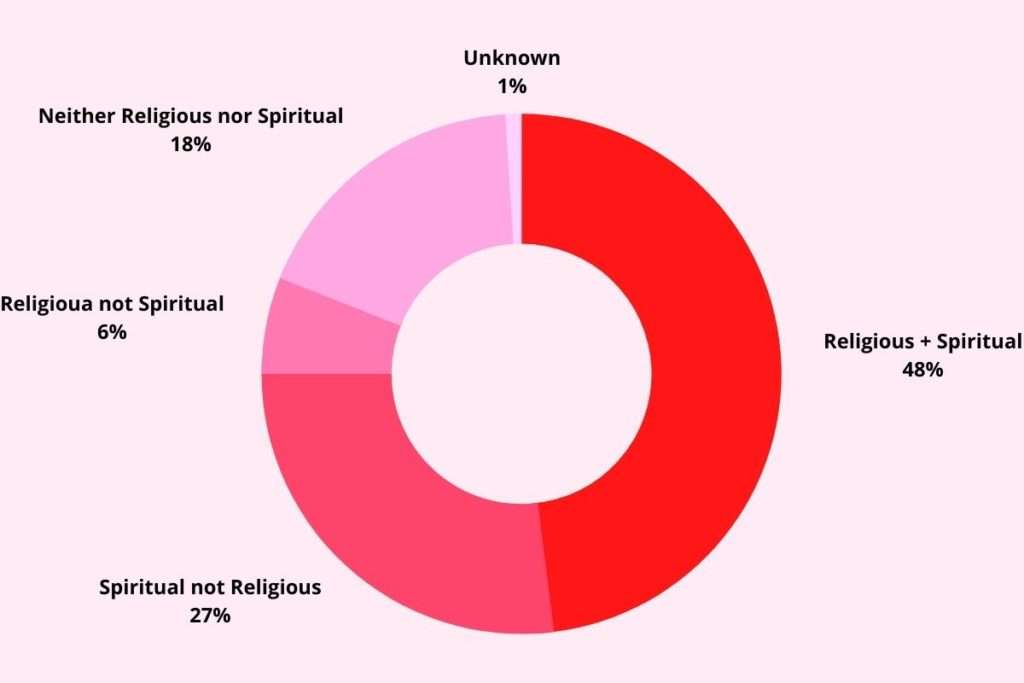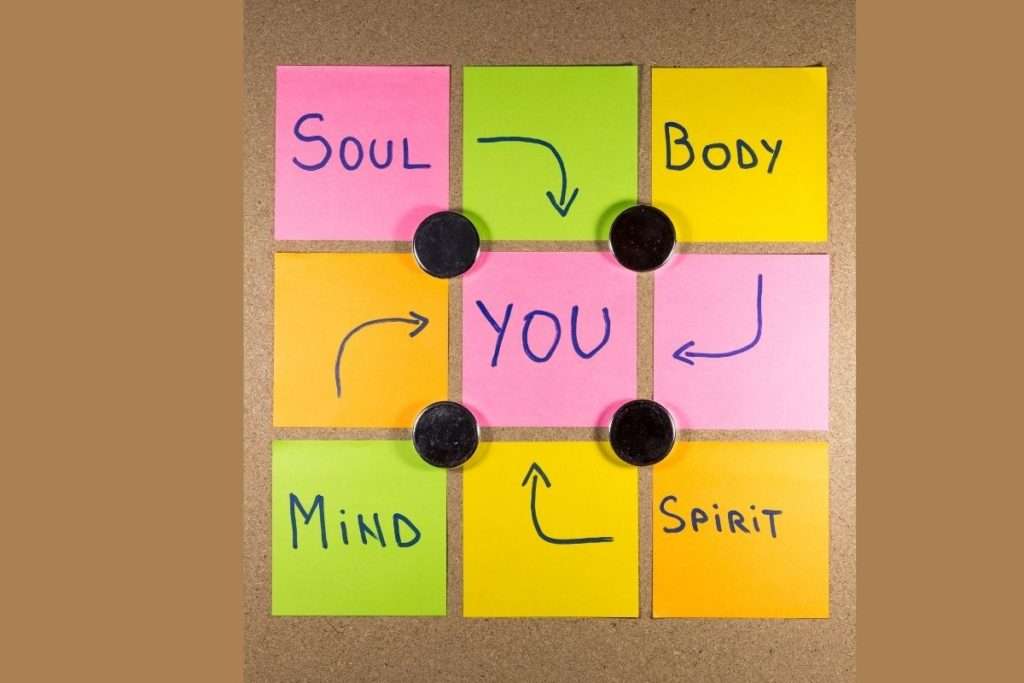For optimal health we must discover and enhance the intricate link between spirituality and health.
Are you familiar with the connection between spirituality and health? Or perhaps you’re wondering if a relationship between the two even exists. Well, luckily you’re about to find out. In fact, the answers to these questions may be more surprising and crucial for your wellbeing that you believe. So, read on for the details.
But, before we proceed, did you know that that 81% of Americans identify as either religious or spiritual (Pew Research Center, 2017). That’s a large percentage of the population. Isn’t it?
These numbers highlight the importance of spirituality, which is an often overlooked, but essential, dimension of health and personal wellness.
- For optimal health we must discover and enhance the intricate link between spirituality and health.
- What's the differences between religion and spirituality?
- The connection between spirituality and healthcare
- 1.Spirituality helps with acceptance of medical diagnosis
- 2.Spirituality helps with coping with health conditions
- 3.Spirituality decreases pain
- 4.Spirituality improves recovery from health conditions
- 5.Spirituality decreases fear of death
- 6.Spirituality improves treatment compliance
- 7.Spirituality improves emotional well being
- 8.Spirituality helps with bereavement
- 9.Spirituality increases life expectancy
- 10.Spirituality improves social support
- 11.Spirituality enhances personal values
- 12.Other healthcare benefits of spirituality
- What is the relaxation response:
- Possible disadvantages of spirituality in healthcare
- What's the difference between healing and curing?
- Final words on spirituality and health
- How can I help someone who is dying
- What are spiritual values?

We are not human beings having a spiritual existence, we are spiritual beings having a human experience. - Pierre Teilhard de Chardin
What’s the differences between religion and spirituality?
Religion refers to specific beliefs and common practices that a group of persons share. However, spirituality is much more internal and refers to your inner beliefs, purpose, and values.
Spirituality may or may not include religious traditions.
Here’s a spirituality course pack for discipleship that deeply changes your relationship with God and helps you develop emotionally healthy spirituality.
The connection between spirituality and healthcare
There are several ways that spirituality and health interconnect. In fact, research has shown that spiritual persons are generally more accepting of their medical diagnoses.
Actually, persons more in tuned with their spirituality tend to comply more easily with medical treatment. Spirituality also enhances coping and recovery from health conditions and surgeries.
Spiritual beliefs have been shown to decrease pain and the fear of death. Further, spirituality improves emotional well being, social support, personal values, coping with bereavement and can ultimately increase life expectancy.
Undoubtedly, spirituality influences numerous areas of both preventative and curative medication, including personal lifestyle and health compliance.
Often, when persons are suffering, many thoughts will flood their minds, particularly those related to spirituality. For various reasons, challenge, stress and illness often propel persons to resort to their spiritual values.
Now, let’s explore the connection between spirituality and health in greater detail.
1.Spirituality helps with acceptance of medical diagnosis
Firstly, many persons are in denial when it relates to their medical diagnoses. This is particularly challenging if their health outlook is poor or the disease is chronic.
However, research shows that persons who are more spiritual tend to accept unfavorable prognoses much easier.
In fact, individuals who are more in tune with their spirituality usually find meaning, even in the midst of struggle and suffering, because of their religious or spiritual belief. Notably, this plays a significant role in acceptance.
If you haven’t already, use this link to discover the spiritual tips for self-care to boost your health.
Check out this video where I discuss the connection between spirituality and health
"Just as a candle cannot burn without fire, men cannot live without a spiritual life." - Buddha
2.Spirituality helps with coping with health conditions
Spiritual beliefs may be useful for coping with disease, illness, and stress. Usually, spirituality improves medical outlook by providing an alternative source of strength and hope.
This spiritual strength is very helpful for coping with their own illness and those of others.
Many persons heed their spirituality only after receiving an unfavorable diagnosis. However, even in these cases, spirituality vastly increases coping abilities.
As a result, they too benefit from higher pain tolerance and greater satisfaction and well-being.
3.Spirituality decreases pain
Persons who are more spiritual have a tendency to experience less pain. And, although pain medication is essential, research shows that prayer is one of the most frequent methods used to manage both acute and chronic pain.
As a matter of fact, persons who engage in spiritual activities usually have an increased tolerance for pain. This higher pain threshold may be almost double that of persons who did not actively engage in spiritual activities (Philip et al., 2015).
4.Spirituality improves recovery from health conditions
Our thoughts, expectations and beliefs greatly affect our health outcome. For instance, many persons benefit from a “placebo effect” perhaps due to resorting to their inner ability to heal.
Notably, the placebo effect is essentially a positive health response from taking a substance that has no therapeutic effects.
Actually, it’s amazing to think of the physical health improvements that can be triggered by simply believing that something will work. I guess the battle really does start in the mind!
5.Spirituality decreases fear of death
Another connection between health and spirituality is that spirituality tends to decrease the fear of death. Firstly, the spiritual person often believes that after death they will be in the presence of a higher power.
Secondly, they may even look forward to being reunited with their loved ones. Subsequently, these beliefs are likely very comforting especially when someone is dying.
6.Spirituality improves treatment compliance
Persons who regularly participate in spiritual activities were shown to comply more with treatment follow-ups after surgery. In fact, they also had better physical function, higher self-esteem, and less anxiety.
It is believed that this is because persons who are more religious have a greater likelihood of following instructions from those with whom they have a close relationship such as their physician (Alvarez et al., 2016).

"Spiritual health is the path to inner peace regardless of the turmoil around you." - Unknown
7.Spirituality improves emotional well being
Studies show that persons who take comfort in their spirituality and religious beliefs are usually happier and more fulfilled. They often feel as though life is more meaningful and that events are worthwhile.
Participating in religious activities may improve your sense of purpose.
Actually, persons who engage in spiritual activities tend to be more optimistic and have an improved mood and quality of life. Also, spirituality leads to greater enjoyment of life, even in the midst of discomfort.
As such, spirituality results in improved mental health, despite medical condition and chronic pain.
Further, a person who is spiritual will likely have greater peace and tranquility, and less anxiety and depression (Philip et al., 2015).
8.Spirituality helps with bereavement
One study showed that as much as 80 percent of persons were comforted by their religious beliefs a year after losing their child. In fact, spirituality helped those parents to adjust much faster both emotionally and psychologically.
Additionally, another research highlighted that persons with stronger spiritual beliefs tend to experience a faster, more complete recovery from bereavement.
Conversely, individuals with no spiritual beliefs often have intensified grief after several months of temporary relief (Walsh et al., 2002).
9.Spirituality increases life expectancy
Numerous studies show that persons who regularly engage in spiritual practices have longer life expectancies.
This is likely because religious beliefs and commitments improve stress levels. Undoubtedly, even though stress may not be a direct cause, it likely makes most-if not all-health conditions much worse.

Scientifically, older adults who attend church have a 50% less likelihood of having elevated interleukin levels. Notably, increased interleukin 6 directly associates with an increased possibility of disease.
"Anything that makes you weak–physically, intellectually and spiritually–reject it as poison." -Swami Vivekananda
10.Spirituality improves social support
Whether it be a religious group, yoga class or meditation support, tapping into your spirituality will often lead to access to another social group.
Actually, this spiritual community is a great source of emotional support and comfort. Additionally, social support decreases isolation and may also curb negative and toxic habits.
11.Spirituality enhances personal values
Spirituality has also been known to enhance personal values. Notably, our personal values determine our habits, decision making, they type of people we associate it.
Also, personal values influence our interpersonal relationships, financial decisions and career goals. Actually, some of these personal values may even be unconsciously held and may likely affect every decision that we make.
Click her to discover all the steps needed to expertly achieve behavioral change.
12.Other healthcare benefits of spirituality
According to research, the ‘relaxation response’ has been shown to decrease metabolism, heart rate, brain waves and respiration, blood pressure and headache.
Additionally, meditation has been shown to improve chronic pain, immunity, sleep, depression, premenstrual syndrome, infertility, agitation, anxiety.
What is the relaxation response:
The relaxation response has been praised for its health and antiaging benefits. This ‘everyday meditation’ consists of repeating a sound, word or phrase for 10 to 20 minutes of meditation two times daily.
You should be in a relaxed position with your eyes closed. Additionally, you should try to refocus on that specific word or sound every time your thoughts stray (Martin, 2008).

The personal life deeply lived always expands into truths beyond itself. - Anais Nin
| Spiritual Activity | Health Benefits |
|---|---|
| Yoga | Improves: anxiety, stress, emotional health, weight, metabolism, immunity, flexibility, sleep, memory, posture |
| Meditation | Improves: focus, connection, mood, immunity, energy, self-awareness, stress, pain, memory and overcome toxic habits & addiction |
| Mindfulness | Improves: concentration, self-awareness, self-acknowledgement , compassion, resilience, happiness, toxic habits & addiction |
| Kindness | Improves: energy, happiness, self-esteem, emotional strength, loneliness |
| Gratitude | Improves: energy, mood, optimism, resilience, happiness, sleep, heart health |
| Forgiveness | Improves: anxiety, stress, self-esteem, hostility, toxic habits, depression |
| Community Support | Improves: emotional support, suicide rate, drug abuse & alcoholism, coping skills, longevity |
| Reflection | Improves: toxic habits, stress, productivity, confidence, decision making |
| Nature time | Improves: anxiety, stress, mood, sleep, focus, creativity, coping skills |
| Volunteering | Improves: social Isolation, physical fitness, self-esteem, self-worth |
Use this link to to find out how to break bad habits that affect your health and wealth.
Possible disadvantages of spirituality in healthcare
We’ve discovered the advantages of the connection between spirituality and health. However, as with many things, they are some potential disadvantages.
Now, I’ll discuss some instances that your spiritual views may conflict with your personal wellness.
1.Belief that you’re underserving of healing because of previous sin
Firstly, due to their spirituality, some persons may feel as though they are deserving of the illness. As as result, they may reject treatment and may be unreceptive to medical advice.
Subsequently, this rejection of medical treatment will likely occur at least until the person reconciles with the religious views and reality.
2.Negative coping
In some occasions, due to death or illness, persons may feel additionally disappointed, abandoned and angry due to their spiritual beliefs.
However, although in many instances these feelings may be temporary, it could result in negative or delayed coping.
3.False hope
Being hopeful has an important impact on health outcomes. However, some persons may only believe in performing spiritual activities for healing and may reject other forms of treatment.
Unfortunately, this false hope can lead to adverse health conditions.
For instance, false hope may cause persons to seek unnecessary/excessive medication or even refuse treatment all together.
This false hope usually results in a misuse of resources and a lost of valuable time that could have otherwise been spent with their loved ones.
Yet, even in stances where there is no cure, many persons will still start to heal after they’ve discovered the answers to their spiritual questions.
Read more: 10 Disadvantages of Spirituality You Shouldn’t Ignore
What’s the difference between healing and curing?
Cure is a restoration of the physical body. On the other hand, healing refers to the repairing of the spirit and mind and doesn’t necessarily mean a physical cure.
Actually, healing often leads to a significant improvement in quality of life and a greater sense of wholeness. It’s an objective experience of transcendence from suffering.

"We are not human beings having a spiritual experience; we are spiritual beings having a human experience." - Teilhard Cardin
Final words on spirituality and health
It may be difficult to completely understand the connection between spirituality and healthcare. However, it’s undeniable that the body, mind and spirit must be in harmony for you to experience personal wellness.
Given all of these amazing benefits, I’d suggest that you start investing more time on your spiritual self-care for the simple reason that you may reap a ton of good at a very low price. Try it for yourself and you’ll see what I mean!
Now, click here to learn the best tips to improve your spiritual well-being.
Related Topics
How can I help someone who is dying
According to research persons who are dying often desire one or both of these two things. Firstly, they yearn to find meaning from their life/experience. Secondly they desire to be remembered.
As such, my best advice for helping someone who is dying is to be present and listen attentively to discover what that person truly desires.
Then, either support them in expanding the meaning of their own life or help them discover or make their impact. Essentially, help them appreciate their legacy.
What are spiritual values?
Spiritual values relate to the human soul. Below, we’ll discover the types, importance and examples of spiritual values (Nazam & Husain, 2016):
| Type of spiritual value | Importance of spiritual value | Examples of spiritual value |
|---|---|---|
| Altruistic | Personal Growth | Kindness, Love, Charity, Modesty |
| Humanistic | Guiding values to promote humanity | Forgiveness, Justice, Sincerity |
| Personal | Guide an individual | Selflessness, Humility |
| Divine | Love & submission to God | Compassion, Reverence |
| Affective | Inner peace & harmony | Gentleness, Tenderness, Contentment |
How has your spirituality improved your health and personal wellness? Let me know in the comments below. Also, remember to share this if you found it useful.
References
Alvarez, J. S., Goldraich, L. A., Nunes, A. H., Zandavalli, M. C., Zandavalli, R. B., Belli, K. C., Rocha, N. S., Fleck, M. P., & Clausell, N. (2016). Association between Spirituality and Adherence to Management in Outpatients with Heart Failure. Arquivos brasileiros de cardiologia, 106(6), 491–501. https://doi.org/10.5935/abc.20160076
Martin, S (2008) The Power of the Relaxation Response.
Nazam, F & Husain, A (2016) Exploring Spiritual Values among School Children. International Journal of School and Cognitive Psychology. 3 (2).
Pew Research Center (2017) More Americans now say that they’re spiritual but not religious. Available at: https://www.pewresearch.org/fact-tank/2017/09/06/more-americans-now-say-theyre-spiritual-but-not-religious/
Philip J. Siddall, MBBS, MM (Pain Mgt), PhD, FFPMANZCA, Melanie Lovell, MBBS, PhD, FRACP, FAChPM, Rod MacLeod, MB, ChB, MMedEd, PhD, DRCOG, FRCGP, FAChPM, Spirituality: What is Its Role in Pain Medicine?, Pain Medicine, Volume 16, Issue 1, January 2015, Pages 51–60, https://doi.org/10.1111/pme.12511
Puchalski C. M. (2001). The role of spirituality in health care. Proceedings (Baylor University. Medical Center), 14(4), 352–357. https://doi.org/10.1080/08998280.2001.11927788
Walsh, K., King, M., Jones, L., Tookman, A., & Blizard, R. (2002). Spiritual beliefs may affect outcome of bereavement: prospective study. BMJ (Clinical research ed.), 324(7353), 1551. https://doi.org/10.1136/bmj.324.7353.1551 .
Rushana Greenidge-Horace










Leave a Reply